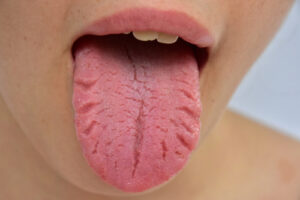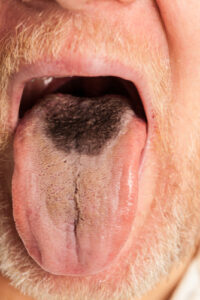What's On This Page?
ToggleEver glanced in the mirror and noticed something unusual about your tongue? Those weird patterns aren’t just random; they’re your body’s way of signaling health issues. Before you shrug it off, let’s decode what your tongue is trying to tell you. I’ll share a question that I received through The Ocala Star Banner newspaper, from one of my readers:
Dear Pharmacist,
Sometimes my tongue has bald, red patches or thick yellowish coatings, making it look quite alarming. It’s embarrassing, and though my doctor brushed off my concerns, I’m turning to you for help. What could be causing this?
First off, breathe easy – your tongue’s appearance, while startling, is a common concern and often not as serious as it seems. You’re describing symptoms that sound like a condition known as “geographic tongue.”
This phenomenon is fascinating because the smooth, red patches that look like a map can shift locations from day to day. This happens because the tiny bumps, known as papillae, temporarily fall off in certain areas.
In traditional Chinese Medicine, the tongue is a critical indicator of health, reflecting deeper issues within your body. While I understand it’s less daunting than undergoing needles and biopsies, it’s still a sign we shouldn’t ignore.

Exploring the Causes
Geographic tongue (also called benign migratory glossitis) can suggest several underlying conditions, such as hormonal imbalances, a low-functioning thyroid, or even liver disease. Factors like poor gut health, prolonged antibiotic use, and nutritional deficiencies, particularly in B vitamins, are common culprits.
Everyday medications can also deplete your body of essential nutrients; for instance, antibiotics, antacids, and anti-inflammatories are notorious for reducing B vitamin levels.

Other Tongue Conditions
- Scalloped Tongue: Often indicates issues with spleen or thyroid function.
- Paleness: Having this may point to anemia, whether due to B12 deficiency or low iron. I know my tongue was pale for a year when I was anemic.
- Vertical Crack: This could be related to stomach or heart problems.
- Black Hairy Tongue: Results from excessive bacteria or fungal growth, where papillae elongate and discolor due to microbial pigments. Image below.
- Glossopyrosis (Burning Mouth Syndrome): Often linked to yeast overgrowth, nutrient deficiencies (like B12, riboflavin, folic acid), or hormone imbalances. You may be interested in reading my article, 7 Considerations For Burning Mouth Syndrome.
Thyroid Disease Increases Tongue Problems
people with autoimmune thyroid conditions such as Hashimoto’s thyroiditis and Graves’ disease may indeed have a higher risk of experiencing tongue issues. These conditions can affect oral health in several ways:
- Hypothyroidism (Hashimoto’s): Hashimoto’s thyroiditis can lead to hypothyroidism, which is characterized by low levels of thyroid hormones. Hypothyroidism can cause various oral health issues, including:
- Macroglossia: This condition involves the enlargement of the tongue, which can make the tongue appear swollen or cause indentations (scalloped edges) along the sides where it presses against the teeth.
- Dry Mouth: Reduced thyroid function can decrease saliva production, leading to xerostomia (dry mouth), which can increase the risk of oral infections and discomfort.
- Tongue Pain or Discomfort: Some patients report a painful, swollen, or uncomfortable tongue.
- Hyperthyroidism (Graves’ Disease): Graves’ disease leads to hyperthyroidism, which increases the production of thyroid hormones. This can also impact oral health and cause problems in the mouth:
- Burning Mouth Syndrome: This is a condition that can cause a burning sensation on the tongue or in the mouth, and it is more frequently reported by individuals with thyroid dysfunction.
- Osteoporosis: Although less directly related to the tongue, hyperthyroidism can lead to bone weakening, including the jawbone, which indirectly affects oral health and your teeth. I’m just putting it here for completeness.
Both thyroid conditions also have a potential link to Autoimmune Gastritis, which can lead to vitamin B12 deficiency.
A deficiency in B12 can cause glossitis (inflammation of the tongue), leading to a smooth, red tongue with a tender or burning sensation.
It’s important for those of you with Hashimoto’s or Graves’ disease to regularly monitor your oral health and discuss any changes or symptoms with your dentist and endocrinologist. I’ve even covered the topic of Lichen Planus which you can read about HERE.
Please use my search box to find more articles about these conditions because I’ve written about both of these disorders numerous times. I also have a book on the subject called “Thyroid Healthy.”
5 Considerations if You Notice an Unusual Tongue
If you notice unusual changes in your tongue—whether it’s new patches, discoloration, swelling, or texture changes—consider these five proactive steps to address the issue:
- Consult a Healthcare Professional: The first and most crucial step is to see a dentist or doctor. They can examine your tongue and provide a diagnosis. Sometimes, the unusual appearance indicates underlying health issues, so it’s essential to rule out any serious conditions.
- Review Your Oral Hygiene: Enhance your oral hygiene routine. Sometimes it’s simple and the issues stem from inadequate mouth care. Make sure you’re brushing twice a day, flossing daily, and gently cleaning your tongue with a scraper or brush to remove bacteria and debris. See a dentist regularly.
- Assess Your Diet: Evaluate your diet for potential irritants or deficiencies. Spicy foods, hot beverages, and certain acidic fruits can irritate your tongue. On the other hand, deficiencies in vitamins such as B12, folate, and iron can also affect appearance. Consider adjusting your diet (adding more leafy greens) or taking supplements to address any gaps.
- Stay Hydrated: Increase your water intake. Dehydration can lead to a dry mouth, which exacerbates oral health problems and can make tongue issues more pronounced. Drinking plenty of water helps maintain the balance of saliva in your mouth, keeping it clean and reducing the risk of infections or discoloration. By the way, you are more prone to headaches if you become dehydrated. Another reason to drink water with some electrolytes.
- Avoid Irritants: If you smoke, vape or use other tobacco products, consider quitting. Tobacco is a significant irritant to the mouth and can lead to various issues, including discoloration and an increased risk of oral diseases. Additionally, limit alcohol consumption, as it can dry out your mouth and irritate your mouth. Do you know what another “irritant” can be? Antibiotics! There are a few cases where ANTIBIOTICS CAUSED BLACK HAIRY TONGUE.
Effective Remedies and Medications
To combat and prevent the recurrence of these symptoms, it’s crucial to address the root causes. Boosting your immune system through quality supplements, ensuring robust gut health with probiotics, and replenishing your body with essential nutrients can make a significant difference.

Supplements such as methylcobalamin (a form of B12), and natural folate as “5-MTHF” can support your overall health and mitigate the effects of nutrient depletion from medications. Consider my custom formula, Mito B Complex which contains all of those. Probiotics should be included or considered because that will help manufacture B vites!
Summary
This organ is so more than just a vital organ for taste—it’s a window into your body’s health landscape.
By understanding and responding to its changes, you can take proactive steps to maintain or improve your health. If you notice persistent changes, consider a holistic approach to your lifestyle and diet, complemented by targeted supplementation. This way, you can not only address the symptoms but also foster long-term health and well-being.
Remember, you are your best health advocate! Stay curious, stay informed, and always be ready to speak up about your health concerns.

Suzy Cohen, has been a licensed pharmacist for over 30 years and believes the best approach to chronic illness is a combination of natural medicine and conventional. She founded her own dietary supplement company specializing in custom-formulas, some of which have patents. With a special focus on functional medicine, thyroid health and drug nutrient depletion, Suzy is the author of several related books including Thyroid Healthy, Drug Muggers, Diabetes Without Drugs, and a nationally syndicated column.




